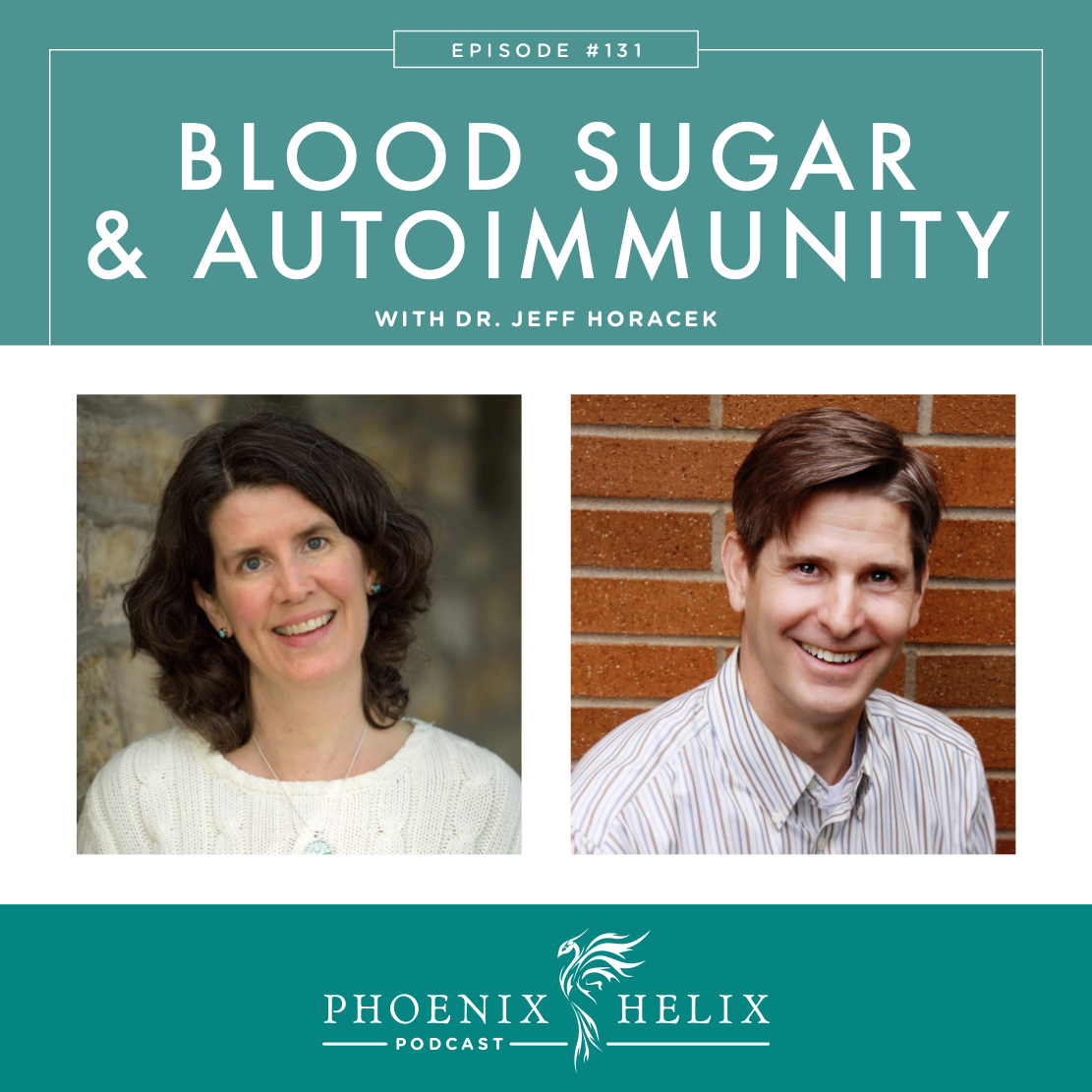
Best of the Phoenix Helix Podcast
In support of my own autoimmune health, I’m taking a sabbatical for the month of December and releasing two of my favorite episodes from the archives that you might have missed. Today’s episode is one of the most popular of all time. Autoimmune health depends on blood sugar balance. When our blood sugar gets too high, drops too low, or swings wildly between these extremes, it increases inflammation in our body. If this happens regularly, it leads to chronic inflammation. In today’s episode, we’ll be sharing diet, lifestyle, and functional medicine tips for achieving and maintaining blood sugar balance. My guest is Dr. Jeff Horacek, a functional medicine physician with over 20 years of experience. Blood sugar is one of his medical specialties.
Listen to the Show
- Subscribe to my podcast through your favorite podcast app: iTunes, Stitcher, Google, TuneIn, Spotify, Amazon, etc.
- You can also listen to the episode right here through the player below, and if you subscribe to my newsletter you’ll get notified of future episodes.
Podcast: Play in new window | Download
Show Notes
- Intro (0:00)
- Thank You to Our Podcast Sponsor – Functional Nutrition Alliance (1:58)
- Full Body Systems is their internationally acclaimed, 10-month online functional nutrition immersion training program.
- It’s designed by world-renowned educator, Andrea Nakayama. Many of you know her as one of my most popular podcast guests. Her unique way of working with patients often leads to results where other practitioners hit dead ends. This program teaches you to do the same.
- If you’re already trained as a health coach, nutritionist, or medical practitioner and want to more effectively help your clients break through healing plateaus, this class is for you!
- And if you’re an aspiring practitioner just getting started, this might be the only training you need.
- You’ll gain detailed knowledge of all the systems in the body, how they interact, how problems develop, and how to personalize diet and lifestyle recommendations for each unique client.
- Enrollment is currently open. To learn more, visit FxNutrition.com/Eileen.
- Meet Dr. Jeff (3:20)
- Dr. Jeff Horacek is a functional medicine physician currently practicing in Hood River, Oregon.
- He grew up in a medical family. His grandfather was a family physician, and his mother was a nurse. He spent many summers of his childhood in the hospital where his mother worked, and developed a love of medicine himself. He started his career in internal medicine, enjoying the detective work that’s a natural part of that specialty.
- 10 years ago, he was asked to begin a diabetes initiative at a medical clinic in Portland, since type 2 diabetes was becoming an epidemic. Blood sugar management became one of his medical specialties, and he developed a deep compassion for people living with chronic illness. His wife has type 1 diabetes, and they actually met when she was a guest speaker for his support group.
- His interest in functional medicine began 5 years ago, in response to some health issues both he and his wife were experiencing. As functional medicine improved their health, they decided to open a practice with this focus.
- What Is Blood Sugar? (8:21)
- Carbohydrates in our diet provide us with glucose that our body then uses to fuel our cells. This is blood sugar, and it’s one of the main sources of energy for our bodies.
- The organs with the biggest role in blood sugar regulation are the liver and the pancreas. The pancreas releases insulin, which moves glucose from the blood into the cells, where it can used as fuel. If we take in more glucose than we need, the liver stores this excess sugar. When needed again, the pancreas releases glucagon, to liberate the sugar stored in the liver so it can be used.
- However, these aren’t the only organs involved in blood sugar regulation. There is an expansive network throughout the body designed to keep blood sugar in balance.
- Types of Diabetes (10:39)
- Type 1 diabetes is an autoimmune disease, where the beta cells in the pancreas which produce insulin are attacked, and the body can no longer make enough insulin. That is why people with type 1 diabetes need to take insulin injections.
- Type 2 diabetes is a problem with the metabolism of the body, where the cells become resistant to insulin. Plenty of insulin is being produced, but the cells have trouble using it.
- Type 2 is much more common than type 1. There are over 30 million people in the US with type 2, and only 1.25 million with type 1.
- Dr. Horacek has seen many people who were misdiagnosed with the wrong type of diabetes. Type 1 usually happens in childhood, but autoimmune diabetes can occur in adulthood as well. This is called LADA (Latent Autoimmune Diabetes in Adults). Since treatment differs greatly, misdiagnosis can be dangerous.
- Diagnosing the different types:
- Type 1 is usually a dramatic presentation with quick onset of severe symptoms: malnourishment, dehydration, and diabetic ketoacidosis. There are also a number of antibodies connected to type 1 diabetes. The two most common ones are anti-GAD and anti-islet cell.
- Type 2 is usually a gradual onset of symptoms and is often combined with obesity, elevated cholesterol, and high blood pressure. When testing the blood for insulin, it usually shows an overproduction rather than an underproduction.
- LADA is often misdiagnosed as type 2, because although autoimmune in nature, it’s often a gradual onset instead of a dramatic one. Insulin continues to be produced for a time, but at decreasing levels.
- Is Alzheimer’s Disease Type 3 Diabetes? (17:59)
- A large percentage of Alzheimer’s patients also have insulin resistance: either type 2 diabetes or prediabetes. There’s an insulin-degrading enzyme in our body that is also responsible for breaking down amyloid plaques in the brain. When insulin production is too high, this enzyme is too busy breaking down insulin to have the resources available to also break down the plaques. When these plaques build up, they can cause dementia. This is why Alzheimer’s disease is sometimes called type 3 diabetes.
- However, not everyone with Alzheimer’s disease has insulin resistance. Other root causes include untreated infections, toxin overloads, and nutrient deficiencies.
- Also, not everyone with diabetes develops dementia. It’s a risk factor, not a guarantee.
- There is a well-researched protocol designed to prevent and reverse Alzheimer’s disease, which Dr. Horachek uses in his medical practice: Bredesen ReCODE Protocol.
- The Dangers of High Blood Sugar (21:45)
- Short-term, it causes fatigue, dehydration, inflammation, and immune system dysfunction.
- Long-term, it increases the risk for dementia, heart disease, stroke, vision loss, and circulation problems body-wide.
- Hypoglycemia and the Dangers of Low Blood Sugar (23:24)
- Severe hypoglycemia: In type 1 diabetics, when there is suddenly too much insulin in the body and blood sugar drops too low, it can be life-threatening with symptoms such as fainting, seizures, or coma.
- Relative hypoglycemia: This is more common in the general population – where blood sugar dips low intermittently throughout the day. This can cause fatigue, anxiety, moodiness, and difficulty concentrating. This is usually part of a pattern of blood sugar rising and falling, rather than staying stable throughout the day. Common causes are poor diet and/or HPA dysregulation (commonly called adrenal fatigue).
- Getting blood sugar balanced is foundational to health overall. It’s one of the first things Dr. Jeff addresses with his patients, even before gut health.
- Blood Sugar and Autoimmune Disease (27:10)
- When blood sugar runs high – even if it’s intermittent with highs and lows throughout the day – it increases the level of inflammation in the body.
- Blood sugar swings also trigger the release of cortisol at high levels, and this causes cortisol resistance. Since cortisol is used by the body to reduce inflammation and it’s no longer able to do that effectively, our inflammation rises even higher.
- One key part of autoimmune health is lowering inflammation, because inflammation worsens autoimmune symptoms.
- Thank You to Our Podcast Sponsor – KC Natural (30:47)
- This podcast is airing right before the new year when many people start the AIP for the first time or do an AIP reset. KC Natural is here to make that easier! They have a complete line of AIP-friendly condiments. When you first begin the paleo autoimmune protocol (AIP), it can be pretty overwhelming. Most of your normal spices and condiments are off the table, and you’re desperately seeking flavor in the kitchen. KC Natural was created to fill that need. They started their company 6 years ago when they launched two different flavors of AIP-friendly barbecue sauce. Their company is located in Kansas City where BBQ is king! Since then, they have expanded their line to include AIP versions of ketchup, mustard, salsa, marinara sauce, teriyaki sauce, and their latest – a dairy-free AIP “buttermilk-style” ranch dressing! How awesome are they? They also have three AIP spice blends: a BBQ rub, seasoned sea salt, and meat & veggie seasoning. Healthy convenience is hard to find in the AIP community, and I’m so grateful to KC Natural for being part of it. You’ll always find KC Natural in my pantry.
- If you’d like to stock up, KC Natural has a coupon for my listeners: 15% off with the code PHOENIX15. Place your order here.
- Signs Your Blood Sugar is Out of Balance (32:40)
- Feelings of exhaustion, moodiness, and brain fog when you’re hungry. Then, when you eat, those symptoms temporarily go away and you feel much better.
- Craving sweets between meals.
- Requiring caffeine for energy.
- When your blood sugar is in balance, eating doesn’t have any impact on energy, mood, or concentration. It’s simply satiating when you’re hungry. You feel balanced physically, mentally, and emotionally throughout the day, regardless of whether you have eaten recently or not.
- Dietary Recommendations for Balanced Blood Sugar (35:55)
- Step 1: Identify food sensitivities and remove those trigger foods from the diet. The paleo autoimmune protocol is a wonderful way to do this.
- Step 2: Eat a healthy breakfast, comprised primarily of high-quality protein and healthy fats. This will minimize the blood sugar impact of any carbohydrates included with the meal. Don’t skip breakfast.
- Step 3: Choose whole food sources of carbohydrates: fruits and vegetables rather than flours or juices. This way, you get the fiber which has a positive impact on blood sugar levels, and benefits the microbiome as well.
- Step 4: Avoid refined carbohydrates and sugary drinks.
- Step 5: Limit caffeine.
- Step 6: If you’re hungry before bed, choose a snack that includes healthy protein and fats again. This will help keep your blood sugar stable throughout the night. Some good options are avocado, nuts (if reintroduced successfully), or a mini meal made up of leftovers.
- Note: Dr. Jeff doesn’t recommend a zero carb diet, and not everyone needs to go low-carb either. Carbohydrate needs vary from person to person. The important thing is to choose whole food sources (fresh fruits and vegetables, emphasizing the veggies more), and eating them alongside healthy fats and proteins. The people most likely to benefit from a low-carb diet are people trying to overcome obesity and insulin resistance, or those diagnosed with diabetes.
- How the Microbiome Affects Blood Sugar (44:05)
- Research shows that higher ratios of firmicutes bacteria in the gut correlate with obesity and insulin resistance.
- In addition, gut dysbiosis (higher levels of pathogenic bacteria) increase inflammation in the body which in turn increases insulin resistance.
- Improving gut health can help improve insulin resistance and stabilize blood sugar.
- How Lifestyle Affects Blood Sugar (47:57)
- Dr. Jeff’s wife has type 1 diabetes and wears a continuous glucose monitor. So, they are able to see immediately the impact lifestyle has on blood sugar levels. If there’s a stressful event, blood sugar rises. The same thing happens after a poor night’s sleep.
- Research also shows that regular movement helps keep blood sugar more stable, with narrower fluctuations. Being sedentary does the opposite, increasing insulin resistance which results in higher blood sugar levels. Dr. Jeff sees this effect among his patients.
- Resources:
- How Hormones Affect Blood Sugar (49:56)
- All the hormones in the body affect blood sugar regulation, including adrenal, thyroid, and sex hormones.
- In menstruating women, it’s common for insulin resistance to increase before menstruation, resulting in wider blood sugar fluctuations.
- This effect is even stronger in perimenopausal women. In addition, perimenopause can cause sleep difficulty, which also raises blood sugar. Perimenopause also increases risk of HPA dysregulation, which in turn destabilizes blood sugar regulation. So, perimenopausal women face blood sugar challenges from multiple directions.
- Resource: Hormone Series.
- Helpful Supplements (53:42)
- Optimize B vitamins.
- Minerals helpful in regulating blood sugar include chromium, magnesium, zinc, and vanadium.
- Berberine improves insulin sensitivity and has even been compared to the prescription drug metformin in research.
- Alpha Lipoic Acid improves insulin sensitivity, supports detoxification, and reduces inflammation.
- Butyrate is produced by beneficial bacteria in the gut when fiber is consumed in the diet, but it can also be taken as a supplement. It decreases insulin sensitivity, improves feelings of satiety, and helps repair leaky gut.
- Blood Sugar Testing (57:41)
- One of Dr. Jeff’s favorite tests to run on all new patients is a fasting insulin level. It’s a blood test that he runs at the same time as a fasting glucose level. If a problem is developing with insulin resistance, it will show up in the insulin test before it shows up in the glucose test.
- For patients with any type of diabetes or pre-diabetes, he also runs an HA1c blood test, which shows the 3 month average of glucose in the blood.
- Type 1 diabetics benefit from a continuous glucose monitor, which is normally covered by insurance. For others, there’s the option of a fingerstick glucose monitor that’s not covered by insurance. The fingerstick monitors also have a 20% margin of error, so they’re best used to spot trends rather than relying too heavily on individual readings.
- For people who don’t have diabetes, simply listening to your body is a wonderful way to track your blood sugar balance. Pay attention to how you feel between meals and after meals. See the “Signs Your Blood Sugar Is Out of Balance” section above.
- For people with diabetes, it’s important to get regular monitoring by a healthcare practitioner.
- Outro (1:02:15)
- Dr. Jeff Horacek works with patients locally through his functional medicine practice in Hood River, Oregon. His wife, Heather Nielsen, is a health coach and licensed counselor at the practice, and she has autoimmune disease herself.
- Eileen (your podcast host) is the author of multiple books, written to help people thrive with autoimmune disease. Learn more on the Books Page.
- If you like this podcast, follow or subscribe through your favorite podcast app. You can also subscribe to Eileen’s biweekly newsletter.
- Check out the entire archive of podcast episodes.
You May Also Be Interested In
with Dr. Vickie Bhatia
Spreading the Word
If you like the podcast, please leave a positive review in iTunes. It would mean the world to me, and also helps others find the podcast. Here are some quick instructions using your iPhone:
- If you are already subscribed to my podcast: (1) Click the purple podcast icon. (2) At the bottom of the screen, click Library. (3) At the top of the screen, click Shows. (4) Click the Phoenix Helix podcast image. (5) Scroll down the page, and you’ll see Ratings and Reviews. Scroll down a little bit more and click on Write a Review. This will bring up the review screen. Tap 5 stars (if you love the podcast), and then click in the title box, and it will bring up the keyboard. Enter a title and short review. (6) Click Send in the upper right corner. (7) Thank you! Positive reviews give the podcast a higher search ranking in iTunes, helping people find it and letting them know it’s a quality podcast and worth their time to listen.
- If you haven’t subscribed to my podcast: (1) Click the purple podcast icon. (2) In the lower right corner, click the magnifying class. (3) Type Phoenix Helix in the search box. (4) Click the podcast cover in the Show list. (5) If you’d like to subscribe, click the + sign at the top of the screen. (6) To write a review, scroll down the page, and you’ll see Ratings and Reviews. Scroll down a little bit more and click on Write a Review. This will bring up the review screen. Tap 5 stars (if you love the podcast), and then click in the title box, and it will bring up the keyboard. Enter a title and short review. (7) Click Send in the upper right corner. (8) Thank you! Positive reviews give the podcast a higher search ranking in iTunes, helping people find it and letting them know it’s a quality podcast and worth their time to listen.








I think this is going to be a lifechanging podcast for me. I have two autoimmune conditions. I am 59 years old, eat low carb and exercise regularly. Recent bloodwork shows elevated fasting blood sugar, elevated fasting glucose, and an A1c that indicates pre-diabetes. It didn’t make sense to me, but LADA, the latent autoimmune diabetes in adults does make sense! Thank you for bringing this to light for me. You are an invaluable resource. Thank you!
Amy, thank you so much for telling me this. That’s the most rewarding feedback I can get about my podcasts – that it fills in a missing puzzle piece in your own health. Wishing you wellness, always!